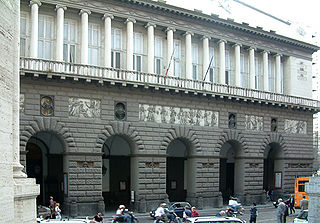
The Mikado; or, The Town of Titipu is a comic opera in two acts, with music by Arthur Sullivan and libretto by W. S. Gilbert, their ninth of fourteen operatic collaborations. It opened on 14 March 1885, in London, where it ran at the Savoy Theatre for 672 performances, which was the second-longest run for any work of musical theatre and one of the longest runs of any theatre piece up to that time. Before the end of 1885, it was estimated that, in Europe and America, at least 150 companies were producing the opera.
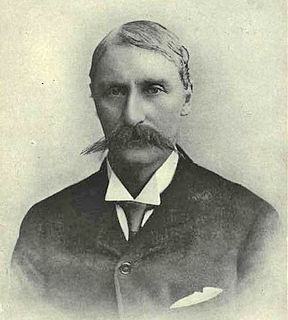
Alfred Cellier was an English composer, orchestrator and conductor.

Richard Barker Cobb Temple was an English opera singer, actor and stage director, best known for his performances in the bass-baritone roles in the famous series of Gilbert and Sullivan comic operas.
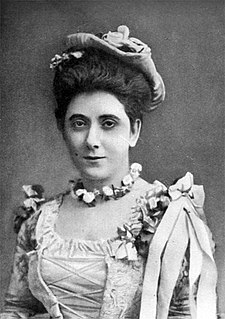
Leonora Braham, born Leonora Lucy Abraham, was an English opera singer and actress primarily known as the creator of principal soprano roles in the Gilbert and Sullivan comic operas.
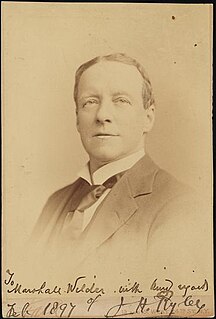
John Handford Ryley was an English singer and actor, best known for his performances in the comic baritone roles of the Savoy Operas with the D'Oyly Carte Opera Company, particularly in America. His second wife was D'Oyly Carte performer, actress and playwright Madeleine Lucette Ryley.
Harry Emerson Rowbottom was a Republican U.S. Representative from Indiana.

William Eastin English was an American attorney and politician, a U.S. Representative from Indiana. He was the son of vice-presidential candidate and businessman, William Hayden English, and his wife Emma Mardulia Jackson.

The Sneath Glass Company was an American manufacturer of glass and glassware. After a brief 1890s startup in Tiffin, Ohio, the Company moved to Hartford City, Indiana, to take advantage of the Indiana Gas Boom. The small city was enjoying the benefits of the Indiana Gas Boom, and could provide natural gas as an energy source for manufacturers. Sneath Glass was one of many glass manufacturers that moved to the region, and became Hartford City's second largest employer.
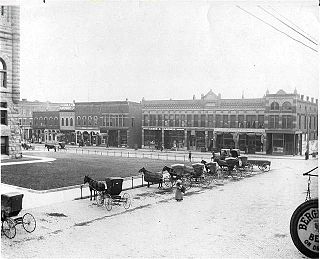
Hartford City, Indiana, began in the late 1830s as a few log cabins clustered near a creek. The community became the county seat of Blackford County. Located in the north east-central portion of the state, the small farming community experienced a 15-year "boom" beginning in the late 1880s caused by the discovery of natural gas. The Indiana Gas Boom caused the community to transition from an agricultural economy to one that also included manufacturing. During the 1890s, Hartford City was the home of the nation's largest window glass company and the nation's largest producer of lantern globes.

Milton Parker "Mikado Milt" Scott was an American professional baseball player whose career spanned from 1882 to 1889. He appeared in 341 Major League Baseball games over four seasons as a first baseman for the Chicago White Stockings, Detroit Wolverines, Pittsburgh Alleghenys and Baltimore Orioles. He compiled a .228 batting average with 42 doubles, 10 triples, five home runs, and 132 RBIs.
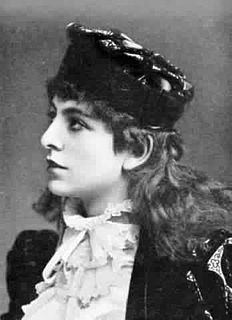
Sybil Grey, born Ellen Sophia Taylor, was a British singer and actress during the Victorian era best known for creating a series of minor roles in productions by the D'Oyly Carte Opera Company, including roles in several of the famous Gilbert and Sullivan operas, from 1880 to 1888. Afterwards, she went on to a long West End theatre career, appearing in both musical theatre and plays.

Henry "Harry" Falkenau of Chicago, Illinois was a musician, music critic and bibliophile who operated an antique book shop at 167 Madison Street, Chicago, Illinois specializing in Americana, first editions, as well as metaphysics. He was also an early defender of Walt Whitman's poetry, taking a First Amendment stand against censorship soon after Leaves of Grass was declared obscene in 1882.
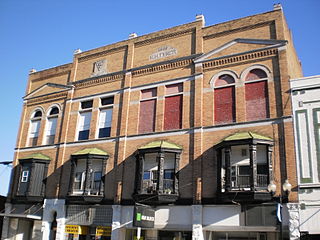
The Hartford City Courthouse Square Historic District is located in Hartford City, Indiana. Hartford City has a population of about 7,000 and is the county seat of Blackford County and the site of the county courthouse. The National Park Service of the United States Department of the Interior added the Hartford City Courthouse Square Historic District to the National Register of Historic Places on June 21, 2006 — meaning the buildings and objects that contribute to the continuity of the district are worthy of preservation because of their historical and architectural significance. The District has over 60 resources, including over 40 contributing buildings, over 10 non-contributing buildings, 1 contributing object, 8 non-contributing objects, and two other buildings that are listed separately in the National Register.
Van Cleve, Van Cleave or Vancleave may refer to:

Hartford City Glass Company was among the top three window glass manufacturers in the United States between 1890 and 1899, and continued to be one of the nation's largest after its acquisition. It was also the country's largest manufacturer of chipped glass, with capacity double that of its nearest competitor. The company's works was the first of eight glass plants that existed in Hartford City, Indiana during the Indiana Gas Boom. It became the city's largest manufacturer and employer, peaking with 600 employees.

Laura Joyce Bell was an English-American actress and contralto singer mostly associated with Edwardian musical comedy and light opera.

Frederick Federici was an Italian-born British opera singer known for his work in the bass-baritone roles of the Savoy Operas written by Gilbert and Sullivan. He is also remembered as a reputed theatre ghost in Australia

